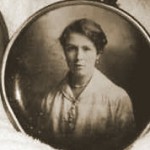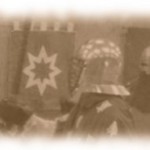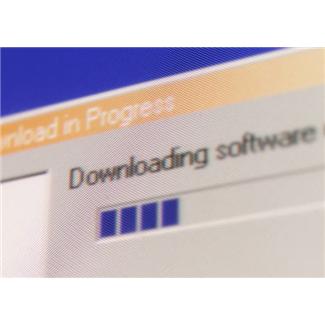Introduction to Genealogy
Tracing Female Ancestors
February 27, 2012 by ramona
Filed under Articles, Genealogy and Surnames, Introduction to Genealogy, Latest News, Lesson 6 Articles
 At one time genealogy only focused on the paternal line, following son to father and so on; with the singular focus of a constant surname followed through time. While the contribution of women to the continuation of the species was recognized, it was sadly neglected in terms of genealogical research.
At one time genealogy only focused on the paternal line, following son to father and so on; with the singular focus of a constant surname followed through time. While the contribution of women to the continuation of the species was recognized, it was sadly neglected in terms of genealogical research.
Following descent from the maternal line was considered to be of little account. Thankfully, those days are gone.
The Biggest Family Tree
Researching maternal lines is every bit as rewarding, important and deserving of recognition, it is after all half of your heritage.
Nothing makes this point more clear than the amazing research done by National Geographic and IBM on the Genographic Project. A study that began much the same way as any family tree project does. With the question, where do we come from? Of course, the question in this case is directed towards the human species as a whole.
The project, which focuses on tracing the migration, patterns of man from our earliest origins does it through the use of Mitochondrial DNA. DNA that can only be passed on from mother to child. Therefore, when it comes to the biggest family tree project of all it looks like the maternal line is finally getting the respect it deserves.
Genealogy Records for Women
In truth, more and more researchers are taking an interest in tracing their maternal roots. While researching female ancestors is rewarding it is also challenging, as women were virtually invisible in terms of leaving a paper trail.
Women did not:
- Own property in their own names
- Pay taxes
- Sign their names to legal documents
- Register to vote.
All these documents commonly used to trace male ancestors are of little use when hunting our elusive matriarchs. Despite this, our female ancestors did have records that were specific to women such as family bibles and diaries; additionally, they were registered either civilly or in a church at birth or baptism, marriage and death and they were recorded in the census. The main thing you need to know about researching your maternal line(s) is that it comes down to following an ever-changing trail of maiden names.
To take the tutorial “Tracing your female Ancestors: Documents and Research Techniques” join us on the Genealogy in General forum.
Image Credit: Ramona Hartley
Genealogy: Crests, Coat of Arms and Surname Origins?
February 24, 2012 by ramona
Filed under Articles, Genealogy and Surnames, Introduction to Genealogy, Latest News, Lesson 5 Articles

Have you ever searched for your surname in Google and come across websites for Family Crests, Coat of Arms and Surname Origins? If you are a genealogy beginner, you may even have gone to the website for information on your ancestors.
The real question here is how much value do these types of websites offer as a reliable source of information for your family tree research?
Surname origin websites, although highly entertaining and interesting, rarely have the information you really need. Many of them sell pre-written generic genealogies based on surname origin. Sadly, these genealogies often have nothing to do with sound family tree research and they can be misleading to those new to genealogy.
Surname Origins
For our first example, let us look at surname origin or surname history sites. Using the name Clegg in a Google search and randomly picking three sites, I find the following.
- The first site states that the Clegg surname “makes an impressive claim to being one of the oldest Anglo-Saxon surnames on record”. Then goes on to say the origins for the name hail from the “Rhine valley as far north east as Denmark”
- The second site surmises the Clegg surname is of English origin and comes from the Old Norse word “Kleggi” meaning at the foot of Owl Hill.
- A third surname origin website tells us that Clegg is an anglicized version of the Gaelic name “Mac Liaig(h)” which evolved into “Claque” and from there to Clegg. This site tells us that the name originates on the Isle of Mann.
From the above examples it is easy to see that while there may be a great deal of research and at least a grain of truth to each example, ultimately the information is contradictory and confusing. Therefore, while we all would like to know the origin of our family names Genealogy Beginner advises that it is best to regard these types of genealogy websites with a wee bit of skepticism.
Family Crests and Coat of Arms
Crests
A family crest historically is part of a family Coat of Arms or heraldry. It is called a crest because it was mounted on the top of a helm above the shield on a Coat of Arms. By the 13th century, a crest was used as a means of identification in tourney (think the movie – A Knights Tale) or on the battlefield.
Coat of Arms
A Coat of Arms also began as a way to identify an individual on the battlefield. Coat of Arms literally gets its name from a coat worn over armor or chain mail and was used initially to protect the armor or keep it cool under the hot sun during the crusades. Later it was decorated with identifying colors and designs in order to help distinguish friend from foe.
Ultimately a Coat of Arms is:
- An Armorial right that must be granted under due authority
- Usually the Crown or State
- Some governments (Canada) have the authority to grant the right.
Alternately, the right to bear arms can come from decent or “by virtue of ancestral right”.
What all this really means is that a coat of arms belongs to a direct family line and any website that tries to sell you your Coats of Arms is selling you a generic product that may or may not have anything to do with your lineage.
Overall, there is no real harm in surname origin or Coat or Arms websites so long as you are not misled into believing that they are an authority on your individual family tree. If you really want to know the origin of your surname (or whether or not there is a Coat of Arms associated with it) you will have to put the hard work into tracing your family tree as far back as you can, using well-established genealogy research techniques.
For more information on surname research, check out Genealogy Beginners Lesson Five: What’s in a Name?
Image Credit: Ramona Hartley
What is a Resident Genealogist?
February 10, 2012 by ramona
Filed under Articles, General Tips, Getting Started in Genealogy, Introduction to Genealogy, Latest News
 A resident genealogist is a professional on staff at a library, archives or even on a genealogy website who is there to provide family tree research advice and guidance, particularly to genealogy beginners. A quick question to the resident genealogist may save you time as well as a great deal of frustration and it can be a lot of fun.
A resident genealogist is a professional on staff at a library, archives or even on a genealogy website who is there to provide family tree research advice and guidance, particularly to genealogy beginners. A quick question to the resident genealogist may save you time as well as a great deal of frustration and it can be a lot of fun.
If nothing else your Genealogist in Residence is almost certainly, part detective and part historian. A website with a resident genealogist is showing you how much they care about you, their members and how important it is to them to help you in every way they can.
What Does a Resident Genealogist Do?
A resident genealogist:
- Searches out new genealogy resources
- Provides educational materials
- Writes articles about genealogy
- Answers questions about family tree research
- Can help genealogy beginners to understand genealogical documents
- Provides tips and inspiration to keep you motivated
The primary duty of a resident genealogist is to help you learn to conduct your own genealogy research.
How can a Resident Genealogist Help Me?
When you have hit a brick wall a resident genealogist can help you find more resources or make suggestions on where to look next. If you are having a difficult time understanding your ancestor’s birth, marriage or death certificate, a resident genealogist is always happy to help. Any problem you come across is like candy to a resident genealogist, so do not be shy about asking.
What Kind of Questions can I ask?
You can ask any questions you need; no question is too big or too small. When asking your question include the details, give the names dates and places of the ancestor you need help with. State why reading a particular document is a problem, is the writing is too faded or messy. Want to know what a third cousin twice removed is or what all those numbers on a Family Tree form mean…just ask!
Genealogy Beginner encourages you to go to our resident genealogist with your questions. You can usually find her on the Ask a Genealogist forum or on our Facebook page.
Image Credit: dbickert via Photobucket
Google Books and Your Family Tree
February 6, 2012 by ramona
Filed under Articles, Genealogy Technology, Introduction to Genealogy, Latest News, Lesson 8 Articles
 Google Books can be an amazing resource for beginning genealogists. Whether you are looking for information specific to your family tree, something related to a current research interest like military records or general information on genealogy; Google Books is a good place to start.
Google Books can be an amazing resource for beginning genealogists. Whether you are looking for information specific to your family tree, something related to a current research interest like military records or general information on genealogy; Google Books is a good place to start.
To Find Google Books:
- Go to Google.com and hit the little arrow at the top of the toolbar next to “more”
- In the drop down menu click on “Books”
You should now be on the Google Books, search page.
Search Google Books for Genealogy Treasures
It is easy to find books with Google Books; all you do is enter a keyword into the search box. For example:
When I enter “Military Records”, I get about 1,860,000 results, including:
· Military records: Confederate soldiers, 1861-1865
· U.S. military records: a guide to federal and state sources
· Army Records: A Guide for Family Historians
A general search under “Genealogy” brings about 6,750,000 results, including:
· Genealogy Online For Dummies
· The Online Genealogy Handbook
· Genealogy: a practical research guide
Of course, you can alter your search terms to be location specific or even surname specific.
Using Google Books to find a specific ancestor can really pay off as well. Using my ancestor “Marin Boucher”, I find the following:
The Boucher heritage
books.google.caLaurent Boucher – 1999 – 298 pages – Snippet view
This map also shows that Marin Boucher and two of his sons, Francois and Jean- Galleran, had settled near the present village of Chateau-Richer about seven miles from Quebec City: It is worthwhile noting that many of the colonists whose …
“200” family trees: from France to Canada to U.S.A.
books.google.ca – Snippet view
The above Jean Galeran Boucher was the son of Marin and Perinne Mallet who were married around 1628 at St-Langis-les-Mortagne,France. Marin Boucher’s parents were unknown but he came from Mortagne.He was the brother of Jeanne who was …
If you want to see information about a book listed just click on the title of the book. By doing this, you may also find (if the author has given permission) “snippets”. Snippets are areas of the book specifically related to you search terms. Snippets will tell you how many pages in the book match your search terms.
When you find a book you are interested in you can select the “Buy this Book” option or “Find this book in a library” and be directed to a library where you may borrow it. Sometimes, if you are lucky the book you find may be out of copyright and available free online.
Another search option you can try with Google Books is “Full View Books”. Select this option when you only want to search for books you can fully view online.
Genealogy Beginner encourages you to try using Google Books for your family tree research. If you find any amazing books, please share your discoveries with other genealogy beginners on the Discovery Panel forum.
Image Credit: someofthisandthat via Photobucket
Adoption and Genealogy: A Primer for Adoptees
January 29, 2012 by ramona
Filed under Articles, Getting Started in Genealogy, Introduction to Genealogy, Latest News
 Growing up in a family with a very healthy and robust “Scotts” pride brought the significance of family history home to me at a young age. From my family I gained an awareness of ancestry. Additionally, I experienced the sense of connection that only comes from knowing your ancestral roots…from the unique perspective of an adopted child.
Growing up in a family with a very healthy and robust “Scotts” pride brought the significance of family history home to me at a young age. From my family I gained an awareness of ancestry. Additionally, I experienced the sense of connection that only comes from knowing your ancestral roots…from the unique perspective of an adopted child.
As an adopted child, no matter how wonderful my family was at involving me in every aspect of their proud heritage, I was always aware that it did not really belong to me. I was equally aware that one day I wanted to trace my own lineage.
Through countless conversations with other adoptees, I know that this is a common theme. As a result, I have come to believe that there is an intrinsic yearning in all of us to seek out and understand our ancestral and cultural origins.
Adoption is a Unique Genealogy Challenge
Genealogy for adoptees presents unique challenges on both emotional and practical levels. Among them are restrictive laws, ethical considerations, rights to privacy and even a sense of taboo associated with an adoptee attempting to trace their family tree.
Not least, among these concerns is the need to be sensitive to the feelings of an adoptive family, who may or may not support the wish to uncover a separate family history. Having said this, it also bears mentioning that an adoptees wish to uncover their genetic origins does not presume a desire to know their birth parents.
Still, out of a sense of loyalty and sometimes a guilty feeling of betrayal, sadly many adoptees wait until their adoptive parents have passed on before beginning any research. Clearly, genealogy for adoptees is a complicated matter that requires a good deal of careful consideration, patience, understanding and support.
If you are an adoptee, who wants to research your genetic family tree here are a few suggestions you may want to revue before beginning.
Seek Support
First Steps
Before you can begin your research, you are going to need a little basic information; you can start by asking yourself the following questions:
Prepare Yourself
Once you have accomplished all of the above steps, you will have gained some understanding of what you are taking on. You will also be far more prepared to begin your research in earnest.
Genealogy Beginner supports the efforts of all adoptees in their quest to discover their roots. Join us on the Ask a Genealogist forum where your questions about genealogy and adoption are encouraged by our resident genealogist, who is also an adoptee.
Image Credit: Nath_013 via Photobucket
Using Google Scholar for Genealogy
January 23, 2012 by ramona
Filed under Articles, Genealogy Technology, General Tips, Introduction to Genealogy, Latest News
 Among the many tools available to genealogy researchers, one that beginning genealogists may not be as familiar with is Google Scholar. Although this wonderful tool is not likely to lead you to any major records databases, it can however direct you towards relevant-to-you information sources for your family tree research.
Among the many tools available to genealogy researchers, one that beginning genealogists may not be as familiar with is Google Scholar. Although this wonderful tool is not likely to lead you to any major records databases, it can however direct you towards relevant-to-you information sources for your family tree research.
Using Google Scholar will also save you a good deal of time. Time you may otherwise spend sifting through millions of hits from common search engine queries.
Google Scholar for Genealogy
Google scholar is a tool that will let you conduct a broad search of scholarly materials possibly containing information on your ancestors.
Google Scholar provides a scholarly listing of:
To give you a better idea of what you may actually find by using Google Scholar as a search source lets first look at one of my ancestors, Marin Boucher. Then try it again with your own research interests.
I know that Marin Boucher was an early settler in New France (what is now modern day Quebec Canada). I can find a great deal of record sources for him through online databases. However, using Google Scholar may lead me to look for additional information I may not otherwise find or even consider.
To find Google Scholar:
You should now be on the Google Scholar, search page.
To get best results with Google Scholar it is best to conduct a narrow search by typing “Marin Boucher” into the search bar including the quotation marks. You will get a good list of hits; however, most of them will be in French.
If you do not speak or read French, You can opt for “Search for English results only” at the top left corner of the page or use the Google Translate tool to read any information you find.
Looking down the list of hits, you will notice that some of them are underlined. The underlined returns will take you to an information source. If you are lucky, the source will be a free online book. Some of the returns (not underlined) will be citations or additional sources such as related articles, PDF documents or directories.
For Marin Boucher we find all of these information types. Because they are all in French, I have used Google Translate before listing a few of them here.
Book:
[BOOK] A Canadian parish in the seventeenth century
[HTML] from google.ca
HR Casgrain – 1880 – books.google.com
… who was buried in the church. Her neighbor, Jean Galleran Boucher, was a family
native of Mortagne. His father. Marin Boucher is one of the oldest settlers
of New France. In the year 1625, it is found …
Cited by 8 – Related articles – Find in AMICUS
PDF Document:
Citation:
[QUOTE] Marin Boucher in Canada: direct descent
Genealogical Society Lanaudière … – 1997 – Genealogical Society …
Find in AMICUS
Related Article:
Related Article and PDF Document:
[QUOTE] Marin Boucher in Canada: direct descent
Genealogical Society Lanaudière … – 1997 – Genealogical Society …
Find in [PDF] “The French-speaking Quebec from 1608 to 1960”
[PDF] from banq.qc.ca
H Charbonneau – The population of Quebec from yesterday to tomorrow, …, 1991 – bibnum2.banq.qc.ca… Jean Guyon (Dion) and Mathurin Robin, Zacharie Cloutier and Sainte Dupont, Jacques Archambault and Françoise Tourault, Marin Boucher, Noel Lee, Abraham Martin, Pierre Miville, that some of the founders of the most cele-bers, the strain that we …Related articles – View as HTML – All 2 versions
From this short list, you can see that I have found several sources of information on my ancestor including:
- A book that is available free on Google Books
- A citation that will lead me to additional information
- A related article available in PDF
There were far more returns than those listed here and although I would likely have come up with these leads with a common Google search it would have taken me far longer to sift through the Google hits to find the most relevant.
Genealogy Beginner encourages you to try using Google Scholar for your family tree research. Additionally, we would love to hear your Google Scholar success stories; share with us and other beginning genealogists on the Discovery Panel forum.
Genealogy Standards: You Need to Know Now
December 17, 2011 by Sherri
Filed under Articles, Genealogy Standards & Guidelines, Introduction to Genealogy, Latest News, Lesson 1 Articles
 You have found some intriguing information on an ancestor that has you very excited.
You have found some intriguing information on an ancestor that has you very excited.
It is a significant event
Gives dates and places
May even promise to break through a brick wall
What it does not have is a proper source citation. Do you believe it or not?
I share the following story with you to demonstrate why learning to use and strictly follow the Genealogy Standards and Guidelines may be the most important lesson you learn.
Here is why Genealogybeginner.com’s Lesson 1 – The Big Five Genealogy standards and guidelines is so important!
Genealogy Believe it or Not
While working on collecting documented evidence to use in a biography for an ancestor. I ran across a web page that claimed to place my ancestor in North America 15 years earlier than previously thought. It also connected him with a notable historic person.
There are two reasons why this information is both extremely exciting and misleadingly dangerous.
Family Tree Excitement
- The source had the BDM information correct
- Another tie to this notable person and my ancestor has been well documented in government sources.
Ancestors in Danger
These two facts make the information I found plausible. However, I have not run across this particular event in any known primary or secondary source.
So, although excited to find this reference, the first thing I did was look for a source citation for the event. Sadly there was none listed, in fact there were no source citations listed for anything. Far too often this is the case and far too often misleading information is assumed to be fact by trusting, inexperienced ancestor hunters.
A Caution for the Genealogy Beginner
1. Indexes, databases and published family trees
Indexes, databases and published genealogical works are wonderful research helps when used correctly. They are not EVER to be considered sources under any circumstances. Indexed information, although associated with a primary source record, is not the record itself.
2. If you can not document the source it is simply genealogy fiction
When recording your information provide a complete and full citation of your sources. Without this information all the work you have done is simply fiction.
Everything you need to know about genealogy standards and guidelines is available to you right here at genealogybeginner.com.
Subscribe today for your need to know lesson on Genealogy Standards & Guidelines
Image credit: haleyb412 via Photobucket
Free Genealogy Software: Making Your Choice
December 10, 2011 by ramona
Filed under Articles, Genealogy Technology, Getting Started, Introduction to Genealogy, Latest News, Lesson 8 Articles
 Choosing a genealogy software program really boils down to choosing the right program for you. To know this you will have to try out a few for yourself. Adding up to three generations during your test trials is a minimum time investment that will:
Choosing a genealogy software program really boils down to choosing the right program for you. To know this you will have to try out a few for yourself. Adding up to three generations during your test trials is a minimum time investment that will:
- Reveal the program that is the best match for you
- Give you a good idea of what your chart and reports will look like
Using this approach helped me narrow it down to the following three excellent choices in free genealogy software.
Genealogy Research Software (Gramps 3.3)
Overall Gramps is a great program that has pretty much every feature chart and report option you could dream of. If you have great computer skills you are going to love it, if not this may not be a good program for you. Gramps also has a few extra features that are quite nice, like the Gramplets feature that helps you monitor your progress and analyze data.
For a more in depth review of Gramps3.3 including a link where you can download the software for free, join us on the Genealogy in General forums now.
RootsMagic 5
The free version of RootsMagic genealogy software is slick, good looking and starts off with an option to import data right at the opening screen. RootsMagic is also loaded with an impressive list of features and extras. The only drawback to this superb free version of the program is that it will not attach documents or allow you to publish your research. However that should not be a great deterrent as those features and many more are available on the full paid version should you choose RootsMagic as your long term genealogy software?
For a more in depth review of RootsMagic including the download links join us on the Genealogy in General forums now.
My Heritage Family Tree Builder
My Heritage open source family tree software has an incredible, easy to navigate layout in a gorgeous design. With fantastic easy access drop down menus and a convenient back button it makes entering data fast and efficient. The downside of this amazing free program is that there is a data entry limit of 250 individuals. I don’t really consider that a serious deal breaker for the beginning genealogist, as you can choose from a three tier upgrade adding as needed; or export to GedCom if you want to change programs.
For a more in depth review with download links of My Heritage join us on the Genealogy in General forums now.
Don’t be afraid to download a few programs and give them a try. I can assure you that removing the unwanted programs is as simple as the initial down loads. Please remember; before you start downloading to scan for viruses.
Don’t forget to join us on the forums for a breakdown of the key features in each of these exceptional free version genealogy software programs.
image credit: office.microsoft.com
Free Genealogy Software – 3 Things to Know
December 3, 2011 by ramona
Filed under Articles, Genealogy Technology, Getting Started, Introduction to Genealogy, Latest News, Lesson 8 Articles
 Eventually most genealogy beginners are going to start thinking about a genealogy software program to record their research. There certainly are a lot of wonderful jam packed programs on the market to choose from. However, during the early stages of an ancestor hunt there is really no need to spend a lot of money (before you even have a good idea of what you want) on a Family Tree software program full of bells and whistles.
Eventually most genealogy beginners are going to start thinking about a genealogy software program to record their research. There certainly are a lot of wonderful jam packed programs on the market to choose from. However, during the early stages of an ancestor hunt there is really no need to spend a lot of money (before you even have a good idea of what you want) on a Family Tree software program full of bells and whistles.
All You Really Need
A simple nuts and bolts genealogy software program that allows you to carry forward with your research, while keeping your family tree organized, is all that is really needed. A practical solution to this is, open source or “free” family tree software, that you can download in 10 minutes or less.
Free Family Tree Software Essentials
1. A good open source program for a beginning genealogist is one that will:
• Easily record your data
• Compile your evidence
• Help you to analyze your findings
2. A better beginning program will be:
• Easy to navigate
• Catch errors
• Provide tutorials
• Offer tech support
3. The best program has all of the above and is:
• Upgradable – you will not have to re-enter your data
• GedCom compatible – you are free to choose whatever long term program you like.
Using open source genealogy software gets you started immediately. In addition, some of these free programs rival a lot of the paid programs available. I know this because I have spent the last few days testing out several of them and am in the process of testing several more.
At this point you may be saying “Gee thanks, but I still don’t know what one to choose”. Not to worry, over the next few days Genealogybeginner.com will have your choices narrowed down to a top three short list of open source programs; perfect for the beginning genealogists. Check back to see the final results.
On the Other Hand
You may have your heart set on purchasing your long term genealogy software program now. Or maybe you are thinking of purchasing one as a gift for someone special? Before you do, make certain you check out Genealogybeginner.com’s Lesson 8: A Look at Genealogy Software. A pivotal lesson that takes a long hard look at the enormous and baffling world of genealogy software, then demystifies it before your eyes.
image credit: treelady via photobucket
Genealogy Beginner’s French Canadian Genealogy Tips
November 26, 2011 by ramona
Filed under Articles, Genealogy for Beginners, General Tips, Getting Started in Genealogy, Introduction to Genealogy, Latest News, Lesson 7 Articles
 The genealogy of Upper Canada and/or French Canadian genealogy are amongst the most difficult spheres of ancestral research. This is true not only for the genealogy beginner but also for professional genealogists. Although this area may have some of the best preserved and indexed records in the world it is also one of the most confusing to investigate. This is true for several reasons, most of them being due to historic and multi-cultural influences such as language and the cultural influences of Acadian and Métis ancestry, all of which makes researching French Canadian roots so exceptional and unique.
The genealogy of Upper Canada and/or French Canadian genealogy are amongst the most difficult spheres of ancestral research. This is true not only for the genealogy beginner but also for professional genealogists. Although this area may have some of the best preserved and indexed records in the world it is also one of the most confusing to investigate. This is true for several reasons, most of them being due to historic and multi-cultural influences such as language and the cultural influences of Acadian and Métis ancestry, all of which makes researching French Canadian roots so exceptional and unique.
The basics of genealogy research in Quebec begins with vital records, however searching for these records requires search strategies more in tune with European genealogical research methods. Before the first of January 1994 there were no civil registrations of births, marriages and burials, these records were the sole dominion of the church.
Church Records
Churches in Quebec were required by law to keep two copies of their registers, one for the church and another that was kept for the district protonotary (chief clerk at the regional courthouse). The registers were turned in to the protonotary once per year and that, for several years, is as close as Quebec came to having a civil register. It was not until 1927 that municipalities gained the right to record births; however, the records seem to indicate that the people preferred the church. To complicate matters further, civil marriages, in fact, any marriage outside of the Catholic Church was not recognized before 1960. An interesting aside to this is that church marriage records are still considered a legal document in the province of Quebec. In 1994 the government of Quebec took over the responsibility for registering all vital events and at that time records of registrations over 100 years old were moved from the district protonotaries to a national archives.
Tips for French Canadian research
With this in mind it is easy to understand why searching for your French Canadian roots can be a confusing prospect. It does help to know what to look for, or perhaps what to look out for would be a better description. Here are some things to keep in mind while working your way through Quebec vital records.
Civil and church records may have discrepancies in information, although the dates are seldom in conflict. Also if you do not find what you are looking for in one set of records check the other set as sometimes the dual documentation policy was not always strictly followed. Although this is rare it does happen, consequently it is worth checking both sets of records.
About Protestant records
Following the British conquest of Quebec up to the late 1820’s the Anglican Church was the only Protestant religion that was legally entitled to keep civil registers, with the exception of a small number located on the Isle of Montreal. Despite this, some Protestant churches still performed marriages, baptisms and burials. For these records you will need to check with the church archives. In 1804 protestant marriages were legalized.
Before the war of 1812 protestant ministers from the states of Vermont, New York and New Hampshire would visit as missionary circuit riders conducting marriages, baptisms and burial services. It is probable that they took their registers with them when they left. This is a good clue on where to look if you have not been able to find records where you expected to find them. An interesting note in this area is that Catholic missionaries would also travel to Vermont and these records were brought back to Quebec.
Illegitimacy was considered a great disgrace within the protestant faith; this resulted in a failure to baptize illegitimate children. Although not conclusive, this is something to take into account if you have covered all other bases and still can not find a record for your generations past.
Catholic records
- French Canadian Catholic records are filled with little quirks, dates are written down in their full form such as One thousand seven hundred and thirty one for 1731.
- Women were listed with their maiden names; take that into consideration when searching indexes.
- Pay attention to the names of witnesses and godparents in the registers as it was common for them to be close family members.
- Notes in the margins of the record can give additional information.
- Illegitimate children within the Catholic Church were often noted as “inconnuu”, for example an illegitimate child may be written down as Francios Inconnu or Genevieve Inconnu. These children will often be found in the census with their family so use that resource to cross reference with an entry of “inconnu”.
Important Collections
Here is a tip that may save you a great deal of time with your French Canadian research. Check the Tanquay Collection; Dictionnaire Genealogique des Familles Canadiennes. (Genealogical Dictionary of Canadian Families from the Founding of the Colony to Our Time) The Tanquay Collection is the work of father Cyprien Tanquay a notable early Canadian genealogist who researched and recorded the origins and family lines of early Canadian colonists. The Collection may have a good deal of your family tree already researched. In it you will find individuals listed with an easy to follow Roman numeral system that lets you know immediately if there are deeper roots in your family tree. Using this collection in tandem with the Drouin Collection (The repository of Quebec Vital and Church records) and the Canadian Census Collection for Quebec will eliminate a great deal of frustration.
Language
One other slightly intimidating obstacle to French Canadian genealogy is that the records are written in French. Do not let this scare you away there is a simple formula that you can follow even if you do not speak a single word of French.
Dit names
Lastly, educate yourself about dit names. A dit name is the name that was used to differentiate one family of a common surname from another. Some of the older families may have several dit names. This is important information because when you are tracing back; the predecessor of the ancestor you are researching may be listed under a different last name. For example if you were researching Michel Simon you may find his father listed as Francois Leonard or Francois Simon dit Leonard or Francois Simon-Leonard as Leonard is a dit name for Simon. Dit names may (not always) be an indication of an ancestor further back in the record so pay attention to them.
The Subject of French Canadian genealogy covers a large area of which this post only scratches the surface. If you have any questions or for information on how to read a French Canadian Church Vital record entry check out the Ask a Genealogist Forum.
